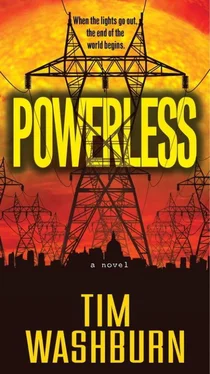One of the other doctors leans over the table and begins squeezing the still heart.
“I cannot suture without more light. Find me a goddamn flashlight right now,” Dr. Jackson says in a low, menacing voice.
There’s a mad scramble to find a flashlight or anything that could be construed to be a light source. Someone produces a small penlight from one of the drawers and passes it forward to the attending nurse. She clicks it on and splashes the narrow beam into the chest cavity. A large pool of blood is forming around the new heart.
“Suction!” Dr. Jackson shouts.
“Doctor,” one of the other nurses says timidly, “there is no suction.”
Doctor Jackson howls out a scream of frustration.
Five minutes later, the hospital’s backup generator powers on. Mr. Hall, the proud recipient of a new heart he had waited eight months to possess, is on the verge of bleeding out.
“Hang two units of AB positive,” Dr. Jackson orders. “Charge paddles.”
The nurse hands him the defibrillator’s paired internal paddles. He waits for the physician delivering cardiac massage to clear his hands from the chest cavity before placing the paddles on either side of the new heart and triggering an electrical shock.
He pulls the paddles clear. “Suction, please. I need to be able to see the entire organ.” His voice has lost all urgency.
One of the nurses places a tube into Mr. Hall’s chest and suctions out the spilled lifeblood of their patient.
“Charge paddles.” He inserts the paddles and triggers another shock. No response. He dejectedly hands the small paddles to the nurse.
He exhales an exasperated sigh and says, “Time of death is 17:59.”
On the Mississippi River, New Orleans
Aboard the Ragin Cajun , a paddleboat plying the waters of the Mississippi River in New Orleans, the mayor of the city stands on the top deck observing the devastation enveloping her city. After ten days of nearly constant rain, the recently rebuilt system of levees, floodwalls, and pumps is overwhelmed by water. For fifteen billion dollars the city was supposed to be safe from flooding. But with parts of the Big Easy as much as seventeen feet below sea level, dealing with water intrusion is a constant battle. Of course the whole pumping system was built with the premise that there would always be electrical power to operate it. After the Corps of Engineers replaced the fried pumps, the generators ran for three days before they ran out of fuel. With Lake Pontchartrain and its 630 square miles of surface area on one side and the mighty Mississippi River cutting through the center of town, New Orleans has always been a disaster waiting to happen.
Her chief aide, Chad, lumbers up the narrow staircase and approaches. At sixty-two, Margaret Atwell retired from her job as vice president of a technology start-up to run for mayor of her hometown city. She won in a landslide against a former mayor recently released from prison, but now she’d give anything to turn the clock back.
“Madam Mayor,” Chad says as he approaches, “we’ve received word that the 17th Street, Orleans Avenue, and London Avenue canals are flooding.” On Chad’s belt is a two-way radio attached to a clear earpiece inserted into his ear.
She takes of her glasses and rubs her nose. “God, can’t we get any good news?”
Chad lowers his head and shuffles his feet.
“Send out evacuation orders to those parishes. Have we heard any more from the Corps of Engineers?”
“No, ma’am. Last I heard they were trying to get a fuel barge up the Mississippi.”
“Unless it gets here in the next couple of hours, the entire city will be underwater.”
“I’ll see what I can find out.”
“Thank you, Chad. Would you also get in touch with the local emergency services office for an estimate of the time needed to evacuate the city?”
“You want to evacuate all of New Orleans?”
“I certainly don’t want to, but we may not be left with a choice.” She walks over to the railing and Chad follows. “I’m not sure this city can recover again.”
“But we always have.”
She turns to face him. “According to scientists, the city is sinking as much as an inch a year. That, coupled with the rising sea levels, may spell the final doom for our city.”
Chad takes a step closer to the mayor. “When did you turn into such a pessimist?”
Mayor Atwell looks down at the muddy water coursing under the boat. “I’m not a pessimist. I consider myself well-grounded in reality. But the harsh truth is that New Orleans may become an abandoned city soon to be reclaimed by the marshes. The insurers will raise hell about rebuilding the city only a few years after Katrina.”
Chad pulls the radio from his belt and talks quietly into the handset. After a brief conversation he reattaches the radio. “According to emergency services, evacuating New Orleans takes about thirty hours.”
Mayor Atwell kneads the back of her neck. “I don’t think we have any choice. Contact the governor’s office so they can issue the order to evacuate.”
The Marshall home
The doctor’s predictions proved true—Robert Marshall is a new man, with more energy and vitality than he’s exhibited in years. The power is still out after a week and the generator is running on fumes from the propane tank. Zeke and Lexi have taken up residence with his parents so the generator would have to power only the one water well.
Zeke, lazing in the spare bedroom, dog-ears the page of the well-read paperback and walks into the living room, where he finds his mother reading and his father holding the shortwave radio to his ear.
“Anything?” Zeke says. His father has been fiddling with the radio all week.
“I pick up occasional voices, but nothing steady. From what I can gather we were hit with some type of solar storm.”
“Hear anything about how long we’ll be without power?”
“I don’t think anyone knows. But if I recall correctly from an article I read in Popular Science , it could be a good while. Months certainly, maybe a year or longer.”
“What are we going to do for water when the propane tank runs dry?” Barb says, joining the conversation.
“I’ve got maybe five gallons of gasoline out in the shop. We’ll have to rig up something for the generator but that’ll keep it running for a few more days. After that, I guess we’ll be hauling water from the creek.”
“That water’s not fit to drink,” Barb says.
“We’ll have to boil it before we can drink it. Don’t know that we have many choices, my dear.”
“Dad, I’m going to drive into town. I think it’s worth the gas. Maybe I can find a few things to restock the pantry, or at least find out if there’s somewhere to get more gasoline.”
“I don’t think you’re going to find much, son. But knock yourself out.”
“Zeke, we could use some more toilet paper if you come across any.”
“I think toilet paper is the least of our worries,” his father says.
“I’ll look,” Zeke says, giving his mother a wink. He opens the back door and whistles for Lexi. She creeps from beneath the old shade tree and takes a moment to stretch, leaning back on her haunches with her front feet fully extended in front of her.
“Take your time,” he tells her. Once she’s all limbered up she approaches the pickup, her tail wagging, and climbs into the cab.
Zeke slides behind the wheel of his father’s pickup and double-checks the fuel gauge—half a tank. He slips the truck into gear and eases out onto the roadway. First time all week any of them have driven anywhere. The pickup is the only automobile on the road as he makes a right turn onto the highway. The first stop is the small convenience store/bait shop a short distance away.
Читать дальше












